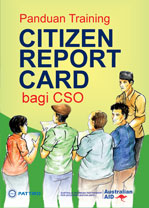 As ruled out in the Act of the Republic of Indonesia No. 31 of 2004 on Regional Government, and the Regulation of the Republic of Indonesia No. 37 of 2007 on Distribution of Governmental Affairs between the Central Government, Provincial Government and Regency/City Government, the application of decentralization becomes an essential step expected to be capable of cutting off the ‘gap’ between the society and the policy makers. This way, it will allow for the policies to make to be adapted more to the society’s needs. The strong, close bound will also allow local governments to obtain the latest information concerning the society’s problems and preferences, and thus enabling the government—as the service provider—to gain better understanding on the society’s needs and to determine priority policies to fit more to the condition of the respective region.
As ruled out in the Act of the Republic of Indonesia No. 31 of 2004 on Regional Government, and the Regulation of the Republic of Indonesia No. 37 of 2007 on Distribution of Governmental Affairs between the Central Government, Provincial Government and Regency/City Government, the application of decentralization becomes an essential step expected to be capable of cutting off the ‘gap’ between the society and the policy makers. This way, it will allow for the policies to make to be adapted more to the society’s needs. The strong, close bound will also allow local governments to obtain the latest information concerning the society’s problems and preferences, and thus enabling the government—as the service provider—to gain better understanding on the society’s needs and to determine priority policies to fit more to the condition of the respective region.
However, the actual condition of public services in various regions throughout Indonesia shows that there remain gaps. One of the prominent indications is the Human Development Index (Indeks Pembangunan Manusia/IPM) in the Eastern area of Indonesia, which continues to be left behind than that of the Western region. The low IPM value is due to, among others, the inefficiency of government and the limited society’s participation in monitoring public services. Therefore, it is assumed that the efforts taken to improve the public monitoring participation is capable of driving the improvement of public services, as well as improving the society’s sense of belonging towards the results of development.
The AIPD CSO Program implemented through PATTIRO perceives public participation as an essential element of efforts to affect policies so as to achieve fairer, better quality public
services. Participatory approach is expected to be able to accommodate the society’s needs, support poor communities, accommodate marginal groups’ needs, and be more genderresponsive. To better empower the society or community, their active participation needs to be supported by proper knowledge and skills. There are at least three reasons why they need to have these knowledge and skills: first, to guarantee that they can take active roles and contribute in obtaining better public services provided by the government. Second, proper knowledge and skills will allow the society or community to improve their bargain position in affecting and monitoring governmental policies related to public services. Third, these knowledge and skills will help develop local innovation and creativity in solving issues related to public services.
Improvement of public services, which becomes the goal of the AIPD Program, can only be achieved when there is a good mutual interaction between the service providers and the
beneficiaries. Participatory approach on public services is also necessary in affecting policies and public services they receive. One of the methods of representing the society’s voice as public service beneficiaries is by utilizing Citizen Report Card (CRC).
Report Card refers to a tool expected to be capable of gathering judgment from public service users as well as disseminating the information back to both the public service users and
providers. The aspects of service to measure include, among others, the availability, access, and quality of the service received. The comparison of judgment can be applied between types of services within one service unit, between services in one service unit and services in other service units (i.e. between service units), or between a service unit in a particular area and other service units in other areas.
The result of CRC comes in the form of judgment/measurement given by the society upon the public services they received. The result will help drive improvement of public services
by providing recommendations. Furthermore, the improvement in public services will, in the institutional context, eventually actualize a healthy condition where quality services may be
delivered optimally to the society. Through CRC, the improved public services will further also support the growth of the society’s trust and thus encourage them to participate in improving services, drive the efforts to improve the types and units of services previously surveyed, as well as efforts to expand the achieved improvements.
[__wpdm_package id='12029']
